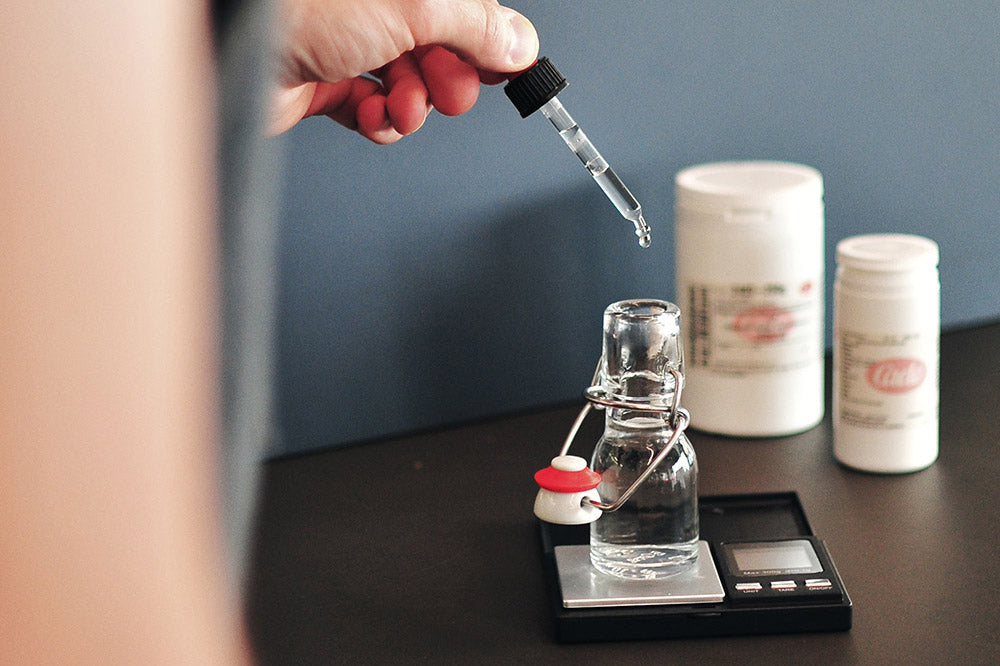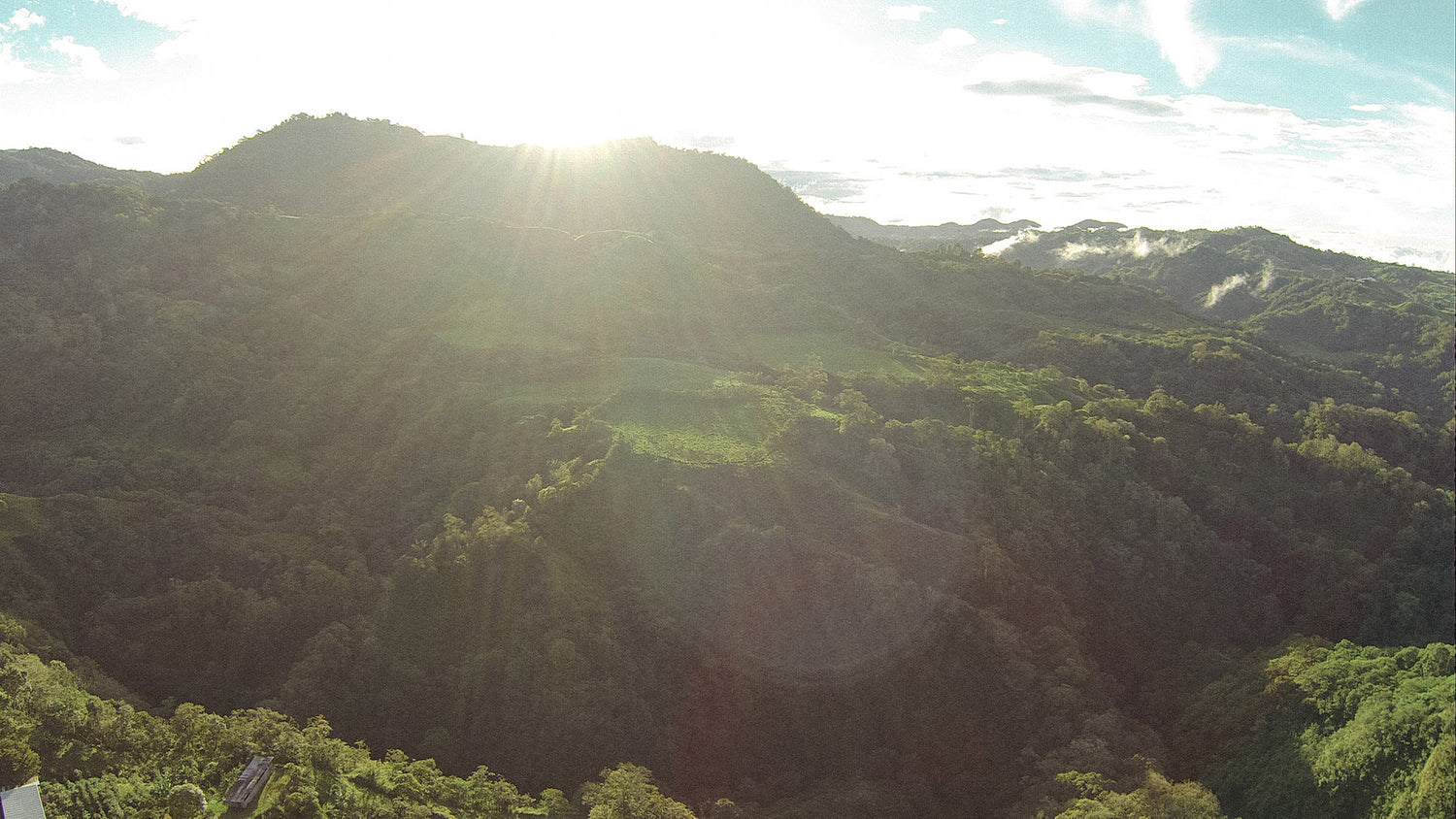Your daily coffee consists of up to 98 percent water - depending on how you enjoy it. That's why it's really important to mix your own coffee water. Or to pay attention to the composition of the coffee water. Many people are probably thankful now: water comes out of the tap in drinking water quality. That's right, drinking water quality. But that's nowhere near the same as coffee water quality. Let's take a look at the whole situation with tap water and coffee water.
Mixing your own coffee water – the current situation
We all know from chemistry class that water is H2O. At least in its pure form. But that's almost never the case. There's always something else in the water: mostly minerals and trace elements. Unfortunately, it's often also contaminated with bacteria, chlorine, microplastics and much more. The water that comes out of our taps (in Germany, Austria or Switzerland) is at least drinking water quality. That means H2O comes out of the tap with different amounts of dissolved substances. The important factors include limescale, discoloration, pH value, microorganisms, etc. All of these ingredients can have a positive or negative effect on our health and the taste of our brewed coffee.
Mix your own coffee water – The hardness
You can use tap water for your coffee without any risk – at least in the DACH region, but also in many other countries. However, tap water is not necessarily ideal for coffee. This is due to the water hardness, which roughly describes the lime content in the water. The lime content can be high for drinking, it does not harm our bodies. But a lot of lime can damage the taste of coffee. Lime is the natural enemy of fruitiness. And nowhere in Germany, Austria or Switzerland does the water come out of the tap as wide as coffee. In the DACH region, the

Hardness of the water is given in degrees German hardness (dH). In Switzerland sometimes also in French hardness. Both hardnesses represent the content of calcium carbonate, CaCO3, and thus the lime content in the water in degrees.
1 °dH = very soft water = 17.86 mg/l CaCO3 = 1.79 °fH
At 0 to 7 degrees German hardness you have soft water, from 8 to 13 it is medium hard water and from 14 to 21 degrees it is hard water.
Mix your own coffee water – From the tap
As already mentioned, you can simply use tap water for your coffee. You won't be able to brew a world-class coffee with it. But you can make a halfway decent coffee with it. There are very strong regional differences in tap water. According to a hardness map from the Federal Institute for Geosciences and Natural Resources, we have hard to very hard water in many areas. In Munich, for example, the water comes out of the tap at 13 to 19 °dH, which is medium to hard. In Vienna, on the other hand, the water comes out of the tap at just 8-9 °dH, which is in the lower middle range. In Zurich, it is also more "soft" to medium hardness at 7 to 10 °dH. There are very large regional differences in each of the countries in the DACH region.
Mix your own coffee water – what should water be like?
As in all areas where things are professional, things are regulated. The Specialty Coffee Association , or SCA for short, also regulates what the optimal water should be.

- Clean, fresh water without odor (e.g. chlorine)
- Clear color
- The amount of dissolved particles should not exceed 150 mg/l, but should be between 75 and 250 mg/l
- The alkalinity of the water should be between 40 and 70 ppm (parts per million) CaCO3, calcium carbonate
- The water hardness must be between 50 and 175 ppm CaCO3
- The pH value should be 7, but at least between 6 and 8
Yes, that is very scientific. However, these standards are not compulsory; they represent the best case scenario and apply, for example, under competition conditions.
Mix your own coffee water – just filter it
The easiest way to optimize your tap water for coffee is to filter it. There are table filters from Brita and other manufacturers that can make the tap water a little softer. Of course, there are also technically sophisticated systems that you can install directly into the water pipe. These cost a little more. But when it comes to the perfect coffee water, the answer for professionals is to mix the coffee water yourself. World Brewers Cup Champion Martin Wölfl quickly discovered this for himself. In his many experiments with water, it emerged that magnesium has a positive effect on the coffee water and the sweetness of the coffee. That's why he uses distilled water and adds minerals and trace elements that take the coffee to a new level, for example with the mineral concentrates from APAX LAB.
Mix your own coffee water – mineral concentrates from APAX LAB
The Australian company APAX LAB specializes in coffee water. For APAX LAB, water is not just a variable, but a crucial ingredient for coffee. That is why it has developed the perfect mineral concentrates in many thousands of experiments to get the best out of every coffee. You can use the concentrates to improve the acidity, sweetness or texture of the coffee, for example. You can use the concentrates - there are three different ones - individually or mixed.
Mix your own coffee water – which concentrates are available
APAX LAB has released three mineral concentrates that you can buy from us individually or in a box . The three concentrates are called TONIK [1], JAMM [2] and LYLAC [3]. The numbers are there to make recipes for concentrate mixtures easier to understand.
TONIK is designed to enhance the lively acidity of your coffees and give your coffee a crisp, intense and juicy kick. TONIK consists of water, magnesium chloride, calcium chloride, sodium chloride, sodium bicarbonate, potassium bicarbonate.
JAMM enhances the role of calcium and bicarbonate. It is designed to enhance the richness and depth of coffee and to bring out the lingering sweetness and creamy mouthfeel. JAMM consists of water, magnesium chloride, calcium chloride, potassium chloride, potassium bicarbonate, sodium bicarbonate.
LYLAC uses the properties of sulfate and potassium to enhance the delicate and floral characteristics of your coffee, creating an elegant, sophisticated and graceful addition with a silky mouthfeel. LYLAC consists of water, magnesium sulfate, magnesium chloride, potassium chloride, potassium bicarbonate, sodium bicarbonate, sodium chloride.
Mix your own coffee water – recipe suggestions
As already mentioned, the three mineral concentrates from APAX LAB also have numbers to make it easier to represent mixing recipes developed by the manufacturer.
TONIK [1] / JAMM [2] / LYLAC [3] – the following recipe suggestions apply to the mixing ratio with 1 liter of water.

2/1/1 means 2 grams of TONIK, 1 gram of JAMM and 1 gram of LYLAC (per 1,000 grams of water)
- Cupping: 2.5/1/0.5
- Washed coffees: 2.5/0.5/1
- Natural coffees: 1/2.5/0.5
- Honey Coffees: 1/0.5/2.5
- Highly fermented coffees: 1/2/2
- Light roast: 1/3/0
- Dark roast: 3/0/1
Important here: Use distilled or at least demineralized water for mixing.
Mix your own coffee water – even afterwards
But you don't have to mix a liter of water every time; you can also reduce the mixing ratio and mix less water or simply add a few drops of the mineral concentrate directly to your already brewed coffee. This also maximizes the taste experience.
- Filter coffee (200 ml): 5-10 drops
- Espresso (40 ml): 1-3 drops
- Milk coffee drinks (150 ml): 3-6 drops
You can also develop your own recipes to make your coffee taste the best. It is important that you stick to the mixing ratio of 3 to 4 grams of mineral concentrate (including blends) per liter of water.
Mix your own coffee water – Conclusion
As you can see, there are many ways to make your dream coffee. The quality of the water you use plays a big role. You can use tap water, but if you want to optimize the taste of your coffee, you should start filtering your water or mix it yourself. The best way is with distilled water and the mineral concentrates from APAX LAB. Just try it out: brew the same coffee with tap water and with purchased bottled water. This alone will make a significant difference in taste. If you use the mineral concentrates, your coffee will reach a whole new level.


